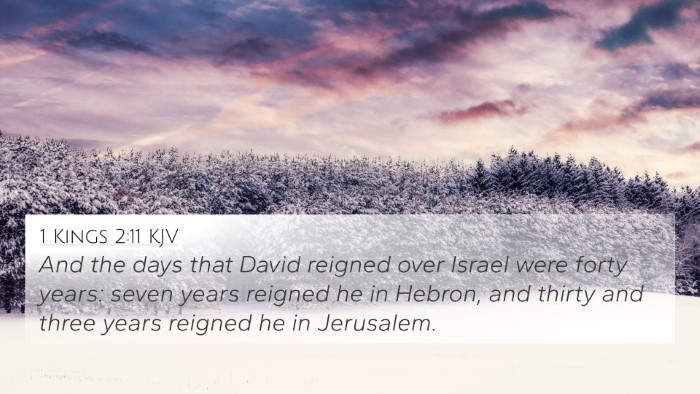Understanding 2 Samuel 2:11
The verse 2 Samuel 2:11 states: "And the time that David was king in Hebron over the house of Judah was seven years and six months." This verse marks a significant transition in the narrative of David’s kingship and offers insights into themes of leadership, divine appointment, and historical context within the Bible. Below is a summarization of various public domain commentaries on this verse.
Commentary Insights
Matthew Henry's Commentary:
Henry emphasizes the chronological aspect of David's reign, noting the specified duration of his kingship in Hebron. This period was characterized by David's establishment of a leadership base and the consolidation of his rule over Judah, which set the stage for his eventual reign over all Israel. Henry suggests that the calculation of time serves a theological purpose, demonstrating God's providence in the timing of David's ascension.
Albert Barnes' Notes:
Barnes highlights the significance of Hebron as a strategic location for David's early reign. He explains that Hebron was a city with historical importance for the Israelites, linking it to Abraham and the patriarchs. Furthermore, Barnes discusses how David’s leadership in Hebron was a precursor to unifying the tribes of Israel, suggesting that this transitional phase was critical in God's plan for Israel.
Adam Clarke's Commentary:
Clarke elaborates on the implications of David's rule over Judah. He discusses the political dynamics of the time, especially regarding the relationship between David and Saul’s house. Clarke emphasizes that this seven-and-a-half-year period signifies a time of preparation for the challenges David would face as he transitioned from a local leader to the king of a united Israel. This commentary points out the spiritual lessons regarding God's timing and preparation for leadership.
Thematic Connections and Cross-References
Understanding 2 Samuel 2:11 involves recognizing connections between various biblical texts. Here are some significant cross-references that illuminate the themes within this verse:
- 1 Samuel 16:1-13 - The anointing of David as king, highlighting God's choice of David.
- 2 Samuel 1:1 - The context of David's ascension following Saul's death.
- 1 Chronicles 3:1-9 - A genealogical record underlining David’s lineage and importance.
- 2 Samuel 5:1-5 - The account of David being made king over all Israel, completing the narrative introduced in 2 Samuel 2:11.
- Matthew 1:6 - The mention of David in the genealogy of Jesus, linking the Old Testament narrative to the New Testament.
- Psalm 78:70-72 - A reflection on God choosing David, emphasizing his role as a shepherd for His people.
- Hebrews 5:4-6 - Discusses the divine calling and appointment of Jesus in the context of priesthood, drawing parallels with David's anointing.
Practical Application
The significance of David's reign over Judah provides profound implications for contemporary readers. It teaches the importance of patience and preparation when waiting for God's appointed time for leadership and responsibilities. Understanding the provided context enhances the interpretation of the Scriptures, allowing for a richer engagement with biblical themes.
To develop a deeper understanding of this passage and its connections to other scriptures, consider utilizing tools for Bible cross-referencing. A Bible concordance can help in identifying connections between Bible verses, while a cross-reference Bible study can facilitate a comprehensive exploration of thematic interconnections.
Conclusion
In sum, 2 Samuel 2:11 is more than just a historical marker; it reflects God's unfolding plan, the nature of leadership, and the preparation of David for greater things. Through the comparative Bible verse analysis provided by public domain commentaries, we gain insight into the rich tapestry of God's narrative. This encourages readers to seek out Bible verses that relate to each other and engage in inter-Biblical dialogue to further enrich their understanding of the Bible.






